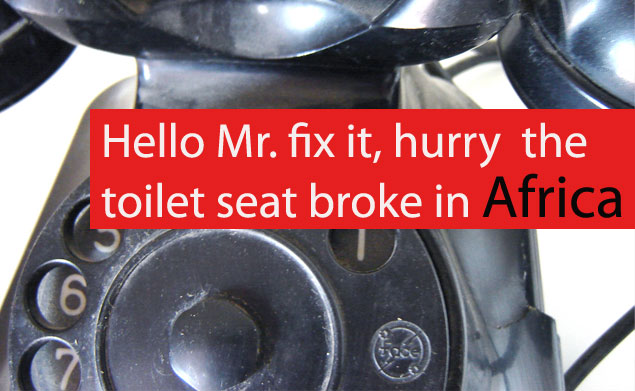Accountability; Intent alone is not enough. We must endeavor to do in order to succeed.
Wednesday found me sitting in a hall full of people on Drexel’s main campus. We had gathered to hear about a charity organization called Staging Hope. Their main focus being raising awareness about the gross human rights violations that have taken place in Northern Uganda over the past 25 or so years. The organizations leader Ms. Melissa Fitzgerald share with us some of the remarkable stories from Uganda as well as the fundraising and legislative moves that have been made on the US side. http://voicesofuganda.org/
All in all, it was a very informative and emotional event. I took many conflicting thoughts from the talk and will share some of them over the coming weeks. The one that I would like to share with you this week centers on the issue of accountability.
In the sense that, whenever there is a major or sometimes even minor problem in an African country, the first call is made for help from another country. For the most part the United States plays the role of Mr. Fix-It. Be it the horrible conflict in Southern Sudan, the pirate issue in Somalia, the drought in Somalia, the Arab Spring in North Africa or the LRA in Northern Uganda, the first call for help is never made to ones own government but rather to the Western world to come in and rectify matters.
This perplexed me for a multitude of reasons. The first and perhaps most naïve is the principle that a lot of African children get raised believing. The principle that if there is something wrong in your life, family, home, you must endeavor first to try and fix it first before you ask for help. The lesson there being that you will learn more from trying to solve your problem than you will watching someone else solve it for you. Yet rather than adopt this fix it first policy, our Plan A as a continent seems to have become, ask for help first.
The second being that once you have asked for help, why then not use that opportunity to learn from the person that has come in to help you such that if a similar problem comes up in the future, you are better able to tackle that situation ?
Now, for a lot of you reading, you will have started to question how I can scale down a conflict like the Sudanese one and compare it to something as simple as fixing a problem in a home. My response would be that although the scale is admittedly much bigger, the principle of trying to solve ones own problems still holds.
Take for example the issue of who should coach our national soccer teams. Of the 55 countries that are currently registered with the Confederation of African Football (CAF), only 26 currently employ a citizen of that country as their head coach. That is to say 27 have opted for a foreigner to manage their flagship side (for those with a keen grasp for math, I left out Rwanda and Zanzibar because as of the writing of this piece, their head coaching positions are vacant). This on a continent of almost a billion people where football is as close to a religion as many come these days.
The arguments for this are multitude, the first one that is brought up constantly is that the citizens of the nation in question are not competent enough to take on the top job. My question then becomes, why are they not offered opportunities to garner this experience and thus become competent ?
Scaling the problem up from football to conflict resolution, the argument that is starting to gain a lot of momentum these days is that the west is the one meddling in our communities and that is why an African solution is not viable, my retort being that that is simply a cop out. How can we continuously seek to pass the buck on to some one else rather than taking responsibility for the part we have played and making efforts to rectify that ?
I acknowledge wholeheartedly that there are problems that are beyond our ability to fix. Issues like floods or ebola outbreaks that we have as yet not developed the technology to combat effectively do need international intervention. The nature of this intervention though must cease to be of the form that encourages us to seek help without ever learning to do things for ourselves.
Why hire an international coach to come to a third world country that can barely pay his wages when there are thousands who would gladly do the same job for a pittance of what he earns a day ?
Why not bring coaching instructors instead to help the coaches within the country get better such that they can take on that head job ?
Why keep looking for a foreign solution to African problem instead of empowering Africans to create uniquely African solutions to our own problems ?
Yes, the engineer from MIT will build a better house than the Ugandan farmer that has never seen steel. But you cannot tell me that taught to use and make steel, the Ugandan farmer cannot come up with an equally durable solution for a village that his family has lived in for generations.
I admire and commend a lot of the work that International aid organizations have done on our continent, organizations like Staging Hope that have shed a light on the issues that go unmentioned in our own back yard. Yet, aid was never meant to be a permanent solution. Rather, I believe, it is supposed to be a tool to help one get to a point where one can take over and build upon the foundation that has been lain for you.
It is my heartfelt belief and plea to you today that the solutions that we as a continent and a people are looking for will not last unless we get actively involved in the creation, deployment, and evaluation of said solutions.
Mahatma Ghandi once declared that one must be the change they wish to see in the world. I would paraphrase and say that we must endeavor to be part of the solution rather than simply accepting our role in the causation of the problem.
Latest posts by Zack (see all)
- Describe Africa to a child? - September 24, 2014
- Daddy what does it take to be an African Woman? - September 4, 2014
- acirfA rethoM - December 4, 2013




